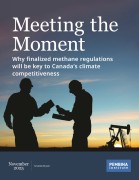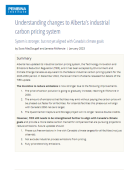This report was commissioned by the Canadian Arctic Resources Committee (CARC) and the Canadian Parks and Wilderness Society (CPAWS), Yukon and Northwest Territories chapters. This report estimate of the extent and pace of development that could occur if known and potential reserves of gas hydrocarbons are developed in three fields within northern Canada: the Mackenzie Delta, Colville Hills and Peel Plateau. In this study ALCES®, a landscape-scale simulation model, was used to estimate the footprint in the three fields of typical gas development over the next 30 years. The model was also used to explore alternative management scenarios that apply several "best practices" currently used in the gas industry.
A Peak into the Future
Potential Landscape Impacts of Gas Development in Northern Canada
June 1, 2005
Publication

Tags:
Programs
Leading the transition to clean energy requires advancing solutions to today’s energy challenges from various angles.
The Pembina Institute has spent four decades working to reduce the environmental impacts of Canada’s energy production and to provide actionable ideas on how to implement clean energy.







